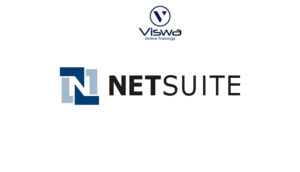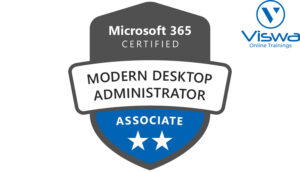DevOps Certification Training
One of the top providers of online IT training worldwide is VISWA Online Trainings. To assist beginners and working professionals in achieving their career objectives and taking advantage of our best services, We provide a wide range of courses and online training.
Learners : 1080
Duration : 30 Days
About Course
DevOps engineers facilitate and automate the software development lifecycle, bridging the gap between development and operations. They work to streamline processes, improve collaboration, and increase the speed and reliability of software delivery. This involves using various tools and practices to automate tasks like code integration, testing, and deployment. Enroll today to earn your certification.
DevOps Training Course Syllabus
✔ What is DevOps?
✔ History of DevOps
✔ What is Dev and Ops
✔ DevOps definition
✔ DevOps and Software Development Life Cycle
✔ Build and release workflow
✔ DevOps main objectives
✔ What is GIT?
✔ Installing Git for Windows
✔ Basic Commands Overview
✔ Diff b/w Git and Svn
✔ Git stages
✔ Creating Branches
✔ Git merge and rebase
✔ Backing Out Changes
✔ Renaming and Moving Files & Deleting Files
✔ Git Repository Setup
✔ Git push, pull, and fetch
✔ Git Stash
✔ Git Conflicts
✔ Git fetch
✔ How to use Github
✔ Over view of Maven
✔ Diff b/w Maven and Ant
✔ How to install Maven in Windows and Linux
✔ Maven Phases
✔ Maven repositories
✔ How to create .Jar, .war and .ear files
✔ How to add dependency files
✔ How to Deploy Executable files in Application Servers
✔ What is CI/CD
✔ Introduction to Jenkins
✔ History of Jenkins/Hudson
✔ How to install Jenkins in Windows and Linux
✔ How to Create Jobs
✔ Diff types of jobs
✔ Working with Github
✔ Working with Build tools
✔ Build from Github Project
✔ Managing Remote Systems with Jenkins
✔ Parameterised Builds
✔ Securing Jenkins
✔ Scheduling Builds
✔ How to install plugins in Jenkins
✔ Setting up Different Types of Automated Builds
✔ How to configure one job to another job
✔ Configure Global Security Jenkins Administration
✔ How to create maven type job
✔ How to create ant type job
✔ Scheduling build jobs
✔ How to deploy code in servers
✔ Authentication and Authorization
✔ How to create Nodes in diff Servers
✔ Most useful 20 plugins
✔ How to install Tomcat in windows
✔ How to install Tomcat in Linux
✔ How to deploy code in Tomcat
✔ Deploying code by using Jenkins
✔ SonarQube
✔ What is SonarQube
✔ How to Install SonarQube
✔ Analyzing with Sonarqube scanner for Maven
✔ Integrate Sonaqube with Jenkins
✔ Introduction to Ansible
✔ Ansible Installation
✔ Configuring Ansible Roles
✔ Writing Playbooks
✔ Executing adhoc commands
✔ Introduction of cloud
✔ Benefits of AWS
✔ EC2
✔ EBS
✔ VPC
✔ ELB
✔ Auto-scaling Group
✔ IAM
✔ AMI
✔ Snapshots
✔ Elastic ip
✔ Learning the Basics of Docker
✔ Introduction to Docker
✔ Containers vs Virtual Machines
✔ Docker Architecture
✔ Docker Hub
✔ Docker Installation
✔ Creating Our First Image
✔ Working with Multiple Images
✔ Packaging a Customised Container
✔ Running Container Commands with Docker
✔ Managing and Removing Base Images
✔ Pushing to Docker Hub
✔ Creating Shared volume groups
✔ Creat own images
✔ All basics of Linux
✔ How to create files, dir, and groups
✔ How to change permissions of files, dir, and groups How to create users
✔ SSh
✔ SCP
✔ Cron
✔ What is SonarQube
✔ How to Install SonarQube
✔ Analyzing with Sonarqube scanner for Maven
✔ Integrate Sonaqube with Jenkins
| Live Instructor Based Training With Software |
| Lifetime access and 24×7 support |
| Certification Oriented content |
| Hands-On complete Real-time training |
| Get a certificate on course completion |
| Flexible Schedules |
| Live Recorded Videos Access |
| Study Material Provided |
DevOps Training - Upcoming Batches
Coming Soon
AM IST
Coming Soon
AM IST
Coming Soon
PM IST
Coming Soon
PM IST
Don't find suitable time ?
CHOOSE YOUR OWN COMFORTABLE LEARNING EXPERIENCE
Live Virtual Training
-
Schedule your sessions at your comfortable timings.
-
Instructor-led training, Real-time projects
-
Certification Guidance.
Self-Paced Learning
-
Complete set of live-online training sessions recorded videos.
-
Learn technology at your own pace.
-
Get access for lifetime.
Corporate Training
-
Learn As A Full Day Schedule With Discussions, Exercises,
-
Practical Use Cases
-
Design Your Own Syllabus Based
DevOps Training FAQ'S
A DevOps engineer is a person who works with both software developers and the IT staff to ensure smooth code releases. They are generally developers who develop an interest in the deployment and operations domain or system admins who develop a passion for coding to move toward the development side.
In short, a DevOps engineer is someone who has an understanding of SDLC (Software Development Lifecycle) and of automation tools for developing CI/CD pipelines
SSH stands for Secure Shell and is an administrative protocol that lets users have access and control the remote servers over the Internet to work using the command line.
SSH is a secured encrypted version of the previously known Telnet which was unencrypted and not secure. This ensured that the communication with the remote server occurs in an encrypted form.
SSH also has a mechanism for remote user authentication, input communication between the client and the host, and sending the output back to the client.
Configuration management (CM) helps the team in the automation of time-consuming and tedious tasks thereby enhancing the organization’s performance and agility.
It also helps in bringing consistency and improving the product development process by employing means of design streamlining, extensive documentation, control, and change implementation during various phases/releases of the project
Get ahead in your career by learning DevOps through VISWA Online Trainings
CAMS stands for Culture, Automation, Measurement, and Sharing. It represents the core deeds of DevOps.
By incorporating Continuous Integration for both development and testing, it has been found that the software quality has improved and the time taken for delivering the features of the software has drastically reduced.
This also allows the development team to detect and fix errors at the initial stage as each and every commit to the shared repository is built automatically and run against the unit and integration test cases
Reviews
Trustindex verifies that the original source of the review is Google. I had a great experience with the Viswa Online Training. The course content was well-structured and covered all the essential topics in a very practical and easy-to-understand manner. The trainer was knowledgeable, approachable, and explained complex concepts with clarity. The mentor was also supportive throughout the training, always ready to guide and clarify doubts whenever needed. Their friendly and encouraging nature created a comfortable learning environment, which made the training even more effective. Overall, I highly recommend this training center to anyone looking to upskill.Trustindex verifies that the original source of the review is Google. Best training institute.Trustindex verifies that the original source of the review is Google. I am grateful for the opportunity to participate training with Viswa Online Training's. The training was highly informative, well-structured, and effectively covered the key concepts. The instructor's expertise and interactive approach made the learning experience engaging and practical.Trustindex verifies that the original source of the review is Google. Excellent training to immerse in Snaplogic. Benefiting from Trainer Subbu knowledge is a privilege.Trustindex verifies that the original source of the review is Google. Nice training institute. Thanks chaitanyaTrustindex verifies that the original source of the review is Google. VISWA Online Trainings is best IT training provider for SharePoint SPFX Training and best faculties with lot of patience and practical experience. Best place to work excellent training by experienced faculties awesome tech support.Trustindex verifies that the original source of the review is Google. It was a great learning experience for Oracle Apps DBA, Trainer has handy experience in the subject also his teaching style was perfect to grasp the knowledge. Study materials, Software and sample practical problems provided was excellent. I'll recommend VISWA Online Trainings for Apps DBA, already I have recommended to my friends and collogues.... Thanks, Chaitanya, for a great learning experience.Trustindex verifies that the original source of the review is Google. The introduction to SAP Ariba with Rohith and the experience were wonderful. The instructor was really helpful and skilled. The course material was thoroughly and credibly covered. Many thanks, Team.Trustindex verifies that the original source of the review is Google. Excellent way of delivering concepts and PowerShell Online Training.




